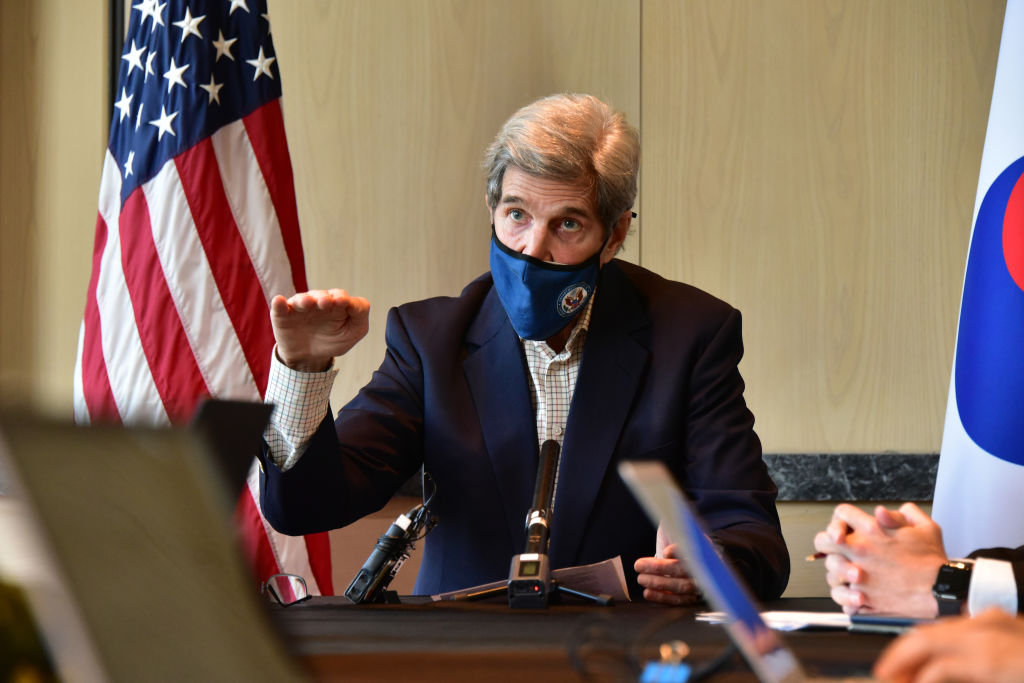John Kerry optimistic about China's 'strong' language on climate crisis following talks


It's rare that China and the United States are on the same page these days, but it appears the two powers made some progress when it comes to addressing climate change this past week.
In a joint statement on Sunday, Washington and Beijing announced they have agreed to cooperate with each other and other countries to "tackle the climate crisis." They will keep discussing "concrete actions in the 2020s to reduce emissions aimed at keeping the Paris Agreement-aligned temperature limits within reach."
Prior to the release of the statement, John Kerry, the Biden administration's climate envoy, traveled to Shanghai last week to meet with his Beijing counterpart, Xie Zhenhua. Kerry said Sunday that his discussions were productive, noting that "this is the first time China has joined in" calling climate change a "crisis." He also expressed optimism about the Chinese delegation saying the issue must be met with "urgency" and the fact that they talked about "enhancing" their emissions reduction goals. The language, at least, is "strong," Kerry said.
The Week
Escape your echo chamber. Get the facts behind the news, plus analysis from multiple perspectives.

Sign up for The Week's Free Newsletters
From our morning news briefing to a weekly Good News Newsletter, get the best of The Week delivered directly to your inbox.
From our morning news briefing to a weekly Good News Newsletter, get the best of The Week delivered directly to your inbox.
Li Shuo, the senior climate adviser for Greenpeace, said the joint statement "is as positive as the politics would allow," given that before its release the message of cooperation between the two countries was not one "we could assume."
President Biden will host a virtual climate change summit this week, with many world leaders expected to attend. Chinese President Xi Jinping has not formally confirmed his participation, but people familiar with the matter said he'll be there, The Wall Street Journal reports. Read more at The Wall Street Journal and Reuters.
A free daily email with the biggest news stories of the day – and the best features from TheWeek.com
Tim is a staff writer at The Week and has contributed to Bedford and Bowery and The New York Transatlantic. He is a graduate of Occidental College and NYU's journalism school. Tim enjoys writing about baseball, Europe, and extinct megafauna. He lives in New York City.
-
 Gabbard faces questions on vote raid, secret complaint
Gabbard faces questions on vote raid, secret complaintSpeed Read This comes as Trump has pushed Republicans to ‘take over’ voting
-
 Which way will Trump go on Iran?
Which way will Trump go on Iran?Today’s Big Question Diplomatic talks set to be held in Turkey on Friday, but failure to reach an agreement could have ‘terrible’ global ramifications
-
 High Court action over Cape Verde tourist deaths
High Court action over Cape Verde tourist deathsThe Explainer Holidaymakers sue TUI after gastric illness outbreaks linked to six British deaths
-
 The world is entering an ‘era of water bankruptcy’
The world is entering an ‘era of water bankruptcy’The explainer Water might soon be more valuable than gold
-
 Climate change could lead to a reptile ‘sexpocalypse’
Climate change could lead to a reptile ‘sexpocalypse’Under the radar The gender gap has hit the animal kingdom
-
 The former largest iceberg is turning blue. It’s a bad sign.
The former largest iceberg is turning blue. It’s a bad sign.Under the radar It is quickly melting away
-
 How drones detected a deadly threat to Arctic whales
How drones detected a deadly threat to Arctic whalesUnder the radar Monitoring the sea in the air
-
 ‘Jumping genes’: how polar bears are rewiring their DNA to survive the warming Arctic
‘Jumping genes’: how polar bears are rewiring their DNA to survive the warming ArcticUnder the radar The species is adapting to warmer temperatures
-
 Environment breakthroughs of 2025
Environment breakthroughs of 2025In Depth Progress was made this year on carbon dioxide tracking, food waste upcycling, sodium batteries, microplastic monitoring and green concrete
-
 Crest falling: Mount Rainier and 4 other mountains are losing height
Crest falling: Mount Rainier and 4 other mountains are losing heightUnder the radar Its peak elevation is approximately 20 feet lower than it once was
-
 Death toll from Southeast Asia storms tops 1,000
Death toll from Southeast Asia storms tops 1,000speed read Catastrophic floods and landslides have struck Sri Lanka, Indonesia, Thailand and Malaysia
